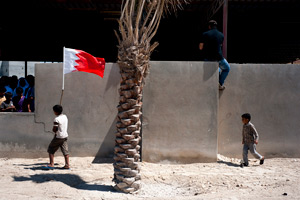Bahrain

Latest from USIP on Bahrain
- May 10, 2012 | Event
On May 10, 2012, the USIP Center of Innovation for Security Sector Governance held its third annual conference. For the second year running, the conference focused on the pressing question of security sector reform in North Africa and the Middle East.
- April 18, 2012 | Event
The Islamists Are Coming is the first book to survey the rise of Islamist groups in the wake of the Arab Spring. Often lumped together, the more than 50 Islamist parties with millions of followers now constitute a whole new spectrum-separate from either militants or secular parties. They will shape the new order in the world's most volatile region, more than any other political bloc, yet they have diverse goals and different constituencies. Sometimes they are even rivals.
- March 29, 2012 | Publication
USIP leaders explain the effect that events around the world and here at home will have on the U.S., and the contributions the Institute can and does make during a time of tremendous challenge – and opportunity.
- February 16, 2012 | Event
The uprisings in the Middle East and North Africa have been accompanied by horrific levels of violence, particularly in Libya, Yemen and Syria. Post-authoritarian transitions will require a focus not only on building the institutions needed to sustain democracies, but also a focus on the myriad issues associated with post-conflict reconstruction. Please join Ambassador William B. Taylor, special coordinator for Middle East Transitions at the U.S. Department of State and Ellen Laipson, President and CEO of the Stimson Center for the second in a series of breakfast briefings organized by the United States Institute of Peace in partnership with the Defense Education Forum of the Reserve Officers Association.
Overview
 June 7, 2011 - On the heels of successful mass protests in Tunisia and Egypt, Bahraini citizens mobilized in massive numbers beginning in February 2011. Initially, the Bahraini monarchy showed a measure of tolerance toward demonstrators, and expressed a willingness to engage the Bahraini opposition in dialogue. As protests continued to grow, however, the monarchy responded with violence and has subsequently equivocated, offering limited concessions but harshly repressing the opposition and those who participate in demonstrations.
June 7, 2011 - On the heels of successful mass protests in Tunisia and Egypt, Bahraini citizens mobilized in massive numbers beginning in February 2011. Initially, the Bahraini monarchy showed a measure of tolerance toward demonstrators, and expressed a willingness to engage the Bahraini opposition in dialogue. As protests continued to grow, however, the monarchy responded with violence and has subsequently equivocated, offering limited concessions but harshly repressing the opposition and those who participate in demonstrations.
This continued in early June when the monarchy officially ended 11 weeks of emergency law but followed the declaration with a violent crackdown by security forces on peaceful protesters hours later. Military units from Saudi Arabia and the United Arab Emirates are still stationed in Bahrain, at the request of the Bahraini royal family. The arrival of these forces in March was accompanied by further violence against Bahraini citizens, characterized by reports of torture, mass arrests, and widespread dismissals of government workers.
While the demands of the Bahraini protesters are both political and economic and, in many respects, mirror those of other protesters around the region, the monarchy and its allies in the Gulf have sought to define the opposition in sectarian terms. Bahrain's Shiite majority has long advocated for greater political inclusion and reform of a political system dominated by a Sunni royal family and a mostly Sunni class of ruling elites. Given the sectarian dimension of this uprising, the prospect for broader regional implications looms large, with Bahrain accusing Iran of fomenting Shiite unrest, a charge the Iranian government has denied.
- Eye on the Middle East and North Africa: Experts from the U.S. Institute of Peace are closely following developments throughout the Middle East and North Africa. In a series of reports and interviews, they cover a wide range of issues. | Spring 2011
Publications & Tools
The following are highlights to USIP's publications and tools on Bahrain.
- Bahrain on the Edge
News Feature | April 28, 2011 - Counterrevolution in the Gulf
Peace Brief | April 2011 - Impact of Arab Uprisings
On the Issues by Mona Yacoubian | April 18, 2011
See all publications and tools on Bahrain
Get Involved with USIP
- See upcoming public events at USIP
- Visit the USIP Newsroom
- Receive latest USIP news and analysis in your email
- Take a class at the Academy

